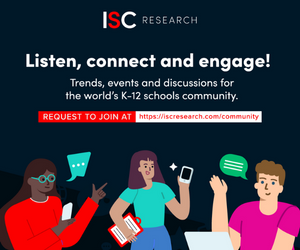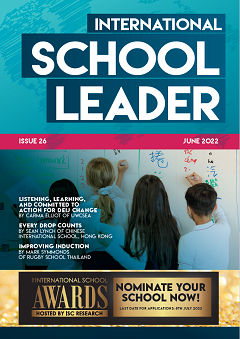By Philippa Wraithmell
In a light-speed world where we needed everything two days ago and perfection at the click of a button, are we prepared for a world in the metaverse? Are we prepared for a world where artificial intelligence (AI) can teach students to be discerning with information? Are we ready to pivot into the future, no matter the direction?
International schools are ever more looking for core skills in candidates. The ISC Research report on Recruitment and CPD in international schools 2021 states that international schools want:
- Evidence of adaptability and flexibility
- Technology proficiency, including skills to use technology to support learning
- Innovation in learning
- Evidence of their continuous learning
“Is your school strong enough to take on the next generation?”
Ready to pivot not react
These are also the skills that we undoubtedly want to impart to the students in our schools. We expect a lot from our students, but when it comes to change in education facilitation, we are less excited about jumping into innovations that can help to shape the students into adaptable and flexible young people, ready for this change.
Educators and school leaders are constantly analysing and being critical of new developments. Are they right for our school? Are they relevant? But is this thinking too slow for our rapidly evolving world?
We should surely work on the ‘now’ and the ‘what is next’ to ensure that we have the capacity to embed these new things before they become reactive decisions. Should we not, as leaders, build in flexibility to be able to pivot when innovation comes our way?
Research also shows that the most in-demand skills required of teachers are based around:
- Leadership learning
- Adaptability and flexibility of leadership
- Technology proficiency
- Data management and tracking
- Empowerment skills
This is a repetition of our desires of recruitment. Is this a lacking skill? We are yearning for people to lead change, use innovative technology to track and monitor, and above all, be adaptable and flexible. All require modern technology and transferable skills.
We cannot ignore this juxtaposition we experience inside some schools: a static education which resists the instant change that our world now demands. Is education reluctant to look, learn and find relevance in innovation?
Ignore at our peril
AI, to name one, is causing a stir, yet we are drawing back from the benefits which we as humans can gain from it, ignoring the fact that AI will run many systems for us by the time some of our students reach the workplace. Is it that we have only just gained skills in one area and feel that we have hit the mark? What we need to do is maintain this, to be proactive with the instance of technological change. There is no glass ceiling in the modern world.
What we need to do is support students to be creative, adaptive and resilient. Change is a norm for digitally native students. We are trying to inspire the students and instil a love of learning. So, in turn, we must prepare staff by training them for an education that can upskill students as proactive, resilient digital natives who can pivot when the new becomes old.
Education should be progressive and move with time. Are we preparing or masking reality? It can feel as though the real world our students live in is not reflected within all education systems. International schools put a great deal of work into supporting skills development, but is there more that we can do?
What should we be doing to truly prepare young people, our educators and schools to be ready for the future? Not just digital technology in our classroom, but further, to artificial intelligence and the metaverse. If it is part of the future of education to teach in the metaverse or live part of our lives there, then educators should be learning about it and preparing for it.
We should be pivoting in education, promoting more diversity and creativity, future-proofing education and talking about change. The benefits of the use of data and AI when used effectively really do outweigh the negatives. Preparing students to use technology with integrity is a core element of learning.
Looking ahead
Moving into a new year, and a mid-way point to the academic year, for many schools feels like an opportune time to be looking forwards in less of a reactive manner. We have recently had to bend and flex reactively. Let us focus on being proactive, having a pivot plan when new technology or education research comes into play.
If we were to map out the next five years of education, would you plan in the range of twists and turns and put it down to the norms we have been accustomed to? Even in a space where digital technology and its educational concepts are still far from perfect, we should plan to expect the unexpected. Just as we do with the array of students who walk into our schools every day.
We should not just keep the current technology that we have, allowing us to maintain our new normal. We should instead, consider how we will proactively ensure that we can build upon the systems that we have in place. Iterate and develop, and create a level of governance around systems for decision-making and the future of our school systems.
Is your school strong enough to take on the next generation?
Are you ready to pivot?
- Develop your digital governance: no matter your budget, schools have no excuse not to be digital. We have a responsibility to students to provide them with education relevant to their future, giving them the skills and resources that they will need in life. Having a team surrounding this, including stakeholders across your school, will allow diverse conversations, clarity of system and support for pedagogy and innovation.
- Create a culture of discussion: talk about new innovations in technology, and discuss them with the staff. Pose them in the positive and create a conversation that allows technology to be normalised. Allow staff to share concerns and views. Allow them to feel safe in not understanding, and inform them. Make technology and innovation a safe topic.
- Personalise: post COVID-19, professional development for technology cannot be one-size-fits-all. Everyone will now need their own way and their own path. This doesn’t need to be tricky, there are many self-paced, online and even face-to-face training available at all budget costs.
- High expectations: have high expectations of digital technology use. Create digital fluency maps for students, staff and even parents. There is much work to be done upskilling communities and supporting students’ awareness of how to use technology effectively. We are all learning. Map out your fluency strategy based on the tools and systems you use in your school, and give everyone the responsibility to be part of teaching it.

Philippa Wraithmell is Assistant Head, Digital Strategy, Learning and Innovation at Rashid and Latifa Schools Establishment, UAE. Connect directly with Philippa on LinkedIn




